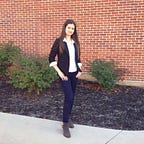Love Makes Us Want To Catch That Knife: “a falling knife has no handle” by Emily O’Neill
We sometimes fail in our own indulgence. We try to stop a situation too dangerous to stop ourselves — lest we make the situation worse. Like trying to catch a falling knife. Emily O’Neill’s poetry collection, “a falling knife has no handle,” has a pronounced emphasis on food and relationships, both decadent and troubled. The two pair together like a recipe and meet in a spin of tumult and how we try to cope. Deliciously, at that.
“you’re supposed to take the blade & say yes / to let it fall without reaching for catastrophe”
Food is a common way of bonding. We all need to eat. We all have favorites and dislikes, make meals, enjoy foods socially, and know someone with food allergies. “Kitchen Note: Severe Seafood Allergy, Seat 2” shares a narrator on dinner dates with a lover who has a seafood allergy. They worry constantly, for they love seafood. They avoid partaking in it so they can touch their lover. The fear is never really gone. Slip-ups, cross-contamination, sitting close to another table that ordered said allergen — dining remains a constant watch for their partner’s well-being and “worry that / you can’t touch me without hives / & your throat swelling closed.” How can they satisfy their cravings?
Any who’ve worked in restaurants and bars may know the feeling of sharing knowledge of menu items and stories to entertain guests. It’s a moment where one can enjoy one’s own food-related loves. “Service Notes” shares language like “guests instead of customers” like friends invited to one’s home to enjoy food and company instead of customers and their money. There’s the love of the places one’s worked at, in the back of house where guests don’t see the chef cooking, even down to images detailed as “noodles like fat blind grubs from my grandfather’s garden” that some may find less than appetizing, but lovingly honest.
There can be a sense of loss and disappointment trying to learn family recipes and skills, as the narrator shares in “If You Could See Where I Learned To Cook.” The narrator seldom cooks for herself. A meal may be “rice for dinner too / from a freezer bag,” lacking in variety or skill to do something more. When helping another cook, there’s “[taking] down the big knife, [thinking] / I’m helping & regret.” Despite the doubt and difference in skill, her grandmother is still proud to see the narrator preparing food, even in ways simple as measuring accurately and crushing nuts. Both feel pride, the narrator in wanting to help more and improve and admiration for her grandmother’s abilities in the art, her grandmother for seeing her grandchild helping her cook and learn.
Love makes us want to catch that falling knife to save one another, or protect ourselves and our many loves. We cut our desires deep in the process and deeper yet before a relationship crumbles or long after, akin to food spoiling. We still get to enjoy these loves while they last and while we still want them as we learn how to manage, even in fantasies. We can appreciate the knife for what it was to us, the way we appreciate the art of cooking recipes we struggle with ourselves, or an old relationship that gives us nostalgia. Just remember that “a falling knife has no handle,” and to enjoy Emily O’Neill’s poems like a fine meal.
